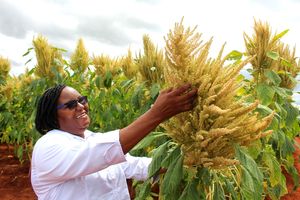Families cut back on healthy diets as food prices hit new high

Purity Nyaboke , a food vendor in Kipkaren Estate in Eldoret, demonstrates changes of pricing on her per boiled beans. The price of the yellow cup of beans has since increased from Sh30 to Sh50 , while that of the black cup has increased from Sh20 to Sh40 . She says the increased cost of cereals has reduced her customer base by more than half this year.
What you need to know:
- Nutritionists caution that elimination of proteins on Kenyan plates will translate to an unhealthy populace granted the critical role of body building and immunity.
Jackline Oriendo, a resident of Gatwekira in Nairobi’s Kibra, has for as long as she can remember stuck to one single and simple menu—ugali and sukuma wiki for supper. She stretches it with watery soup, barely enough to feed her family of six.
And for lunch?
“We hardly have anything for lunch.”
Breakfast?
“Strong tea or nothing at all.”
This is her reality yet one that echoes in many households across the country. Many families are caught up in a tough place of rising food prices and limited resources.
So, as they struggle to put something on the table, it is not a question of a balanced meal but a daily battle of anything, anything at all, to quiet the chorus of growls erupting from their stomachs.
This has given way to the food business. Stalls have mushroomed nationwide, offering a lifeline —cheap, filling meals like chapati and ugali.
But a crucial element, which nutritionists say is the cornerstone of a healthy diet, is slipping away from many Kenyan tables.
“At my house, that is a luxury,” offers the mother of five. She says it in Swahili.
Dolpine Moran, a nutritionist at Eldoret Hospital, says that protein is a foundational nutrient crucial for bodybuilding and energy provision. “It plays a vital role in muscle development and provides essential protection for the body, among other critical functions. Therefore, being deprived of proteins hinders organ growth and overall bodily health, leaving one weak and vulnerable to diseases.”
Jackline acknowledges this reality all too well. When she starts to talk about her five children, she expresses concerns about their poor health yet she feels powerless, and asks, “What can I do?”
As a mobile hairdresser, her livelihood hinges on word-of-mouth referrals to attract new customers. Typically, if she’s fortunate enough to secure at least two appointments in a day, she can earn Sh500. However, today has been unusually quiet, with no calls for hairdressing services coming in yet.

Brenda Achieng, a businesswoman in Eastleigh Estate, Uasin Gishu County, explains that the increased cost of fish per kilogramme from Sh200 to Sh400 has eaten into her customer base.
“On days like this, which have recently become frequent, I turn to any menial jobs that I can find. I mostly take up laundry jobs and take home Sh200 at the end of the day. However, when you factor in rent, school expenses and the day-to-day expenses, there’s little left to think about what I am feeding the children. We don’t even talk about it,” she offers.
Hundreds of kilometres away, George Mwaura, a juakali artisan, goes about his daily tasks in Kipkaren Estate, Eldoret. He starts the conversation off with the financial struggles he is facing when it comes to plating their food, with the highest costs being that of foods rich in proteins.
“I have been facing very tough financial times. There was a time when I could comfortably meet my family’s protein needs through plant-based sources, particularly beans. I made sure my wife prepared githeri with sufficient beans and just a small amount of maize. But with the soaring prices of beans, this has become unattainable for me. Now the proportions are reversed such that the maize is taking up the larger portion,” he says.
For this father of four, the soaring cost of proteins has forced him to reluctantly eliminate yet another essential component from his family’s menu — eggs.
“It's like a tradition, you know? Most parents, myself included, always made sure children got their eggs. At least once a week. Now, weeks go by before they can have some. A while back, the price of one egg was about Sh8 but now it’s Sh15. And meat? That was every fortnight treat, Now it’s once a month, if I am lucky,” he offers.
Milk stands out as one of the most accessible and budget-friendly sources of protein in the country. Considering that Uasin Gishu is predominantly a farming community, with a focus on both crop cultivation and animal husbandry, we inquire from this father of four whether he can still afford this vital source of high-quality protein renowned for its wide array of nutritional and functional health benefits.
“Milk vendors are readily available here in our estate in Kipkaren. However, the pressing question is, where do we find the money to afford large quantities of milk?” He asks.
“Months back, I could purchase a litre of milk for Sh55. However, that price has surged to at least Sh70 per litre. As a result, I have had to come up with a strategy to ensure the young ones in my family still feel like they've had a glass of milk. This involves diluting the milk with water to increase its volume and then splitting it into two portions. One portion is used to make tea for our breakfast, while the other portion is given to the children to drink. The days when children could enjoy a full glass of milk for their nutritional needs are over,” George explains.
But owing to the rising costs of proteins, he says there’s no cheaper option for his family's protein needs so he contends with the health risks that come with a lack of proteins in one’s diet.
“Look at our children here at Kipkaren Estate, most of them are quite physically weak. Ask parents here, who around them has had a glass of milk or an egg recently, and you will understand what I am talking about,” he offers.
Still in the neighbourhood of Kipkaren, we meet Saface Wanyikwa, a father of two who survives on menial jobs. Saface says his family’s menu has had to change because of the high cost of proteins.
“It has become unbearable for me to provide the protein needs of my family sufficiently as the costs are very high. Unless we have special occasions, we don’t get to enjoy protein-based foods. I come from a community that largely depended on ugali as our staple food but currently, pairing our ugali meals is a real headache. For example, ugali and bean stew was a common meal in my home. Now, it’s ugali and sukuma wiki stew or cabbage.”
In his household of four, even other protein sources like beans or lentils are getting pricier by the day. It's a constant battle to put something filling and nutritious on their plates.
“I want to give you a scenario. I have hustled and made Sh200 today. I bought a packet of maize flour at Sh70, tomatoes and onions worth Sh50 and some vegetables which cost me Sh50. I have Sh30 in my pockets to pay for my fare home. How can I afford to buy, say eggs, for my family?”
The question of protein is a non-issue for him, he says.
“Recently we had a blood donation activity in our area and a majority of us could not donate blood because of our health status,” Saface explains.
Benjamin Ketting, a small-scale trader in Eldoret, says his priority, like many other Kenyans, is to manage their daily meals and just push on with life.
“We are going back to associating certain meals to special occasions as we cannot afford them,” he says.
Proteins, Dolpine explains, come from both plants and animals. “Animal proteins are classified as complete proteins, meaning they contain all the nine essential amino acids; while many plant-based proteins have fewer amino acids,” she offers.
The high cost of proteins in the country began in December last year, and it was attributed to recorded poor harvests of plant proteins for two consecutive planting seasons while the increased costs of animal protein has been associated with the increased costs of production in animal husbandry.
“When it comes to animal feeds, the cost has gone up significantly and so farmers have had to translate that cost to consumers to realise profits. Chicken feed pricing has almost tripled in recent months, so the consumers are bearing the brunt,” he says.
At the tail end of Eldoret town is Eastleigh Street, synonymous with fish joints. It is lunch hour but only a few individuals are there.
One of the sellers says that the cost of fish has risen sharply in recent months, thinning their customer base.
“This place used to be buzzing. Customers elbow-to-elbow, plates overflowing with steaming fish and mountains of ugali. But many of those who come here opt for just ugali and vegetables. Some, unable to afford even that, simply skip lunch altogether. There are days I would serve up to 100 to 150 customers per day. That was good money. As we speak, I manage about 20 customers every day,” Nancy Adhiambo notes.
What nutritionists are saying
Rising protein costs in Kenya, affecting both animal and plant-based sources, have nutritionists worried. They emphasise the critical role protein plays in children's development, particularly those between 3-15 years old. Limited protein intake during this crucial growth period can have serious consequences for their well-being.
Protein is a building block for a healthy body. It strengthens the immune system, aids in fighting infections and supports physical growth. From muscle and bone formation to brain development and cognitive function, protein is essential for children's overall health and even impacts their school performance. It also plays a vital role in preventing anaemia.
Nutritionists warn that a lack of protein in children's diets can lead to a cascade of health problems.
A weakened immune system makes them more susceptible to infections. Wound healing becomes impaired and muscle wasting and weakness can occur. In severe cases, protein deficiency can even lead to oedema (fluid buildup), growth retardation, stunting and a severe form of malnutrition called kwashiorkor.
Unlike some vitamins, the human body cannot produce protein on its own. It must be obtained through a balanced diet. With protein becoming less accessible due to rising costs, ensuring children receive adequate amounts is crucial for their healthy development.
“The body cannot do without proteins, unlike some vitamins which can be obtained from the environment. Proteins must be obtained from the food we eat,” says Mildred Maingi, a nutritionist at TechnoServe Kenya.






